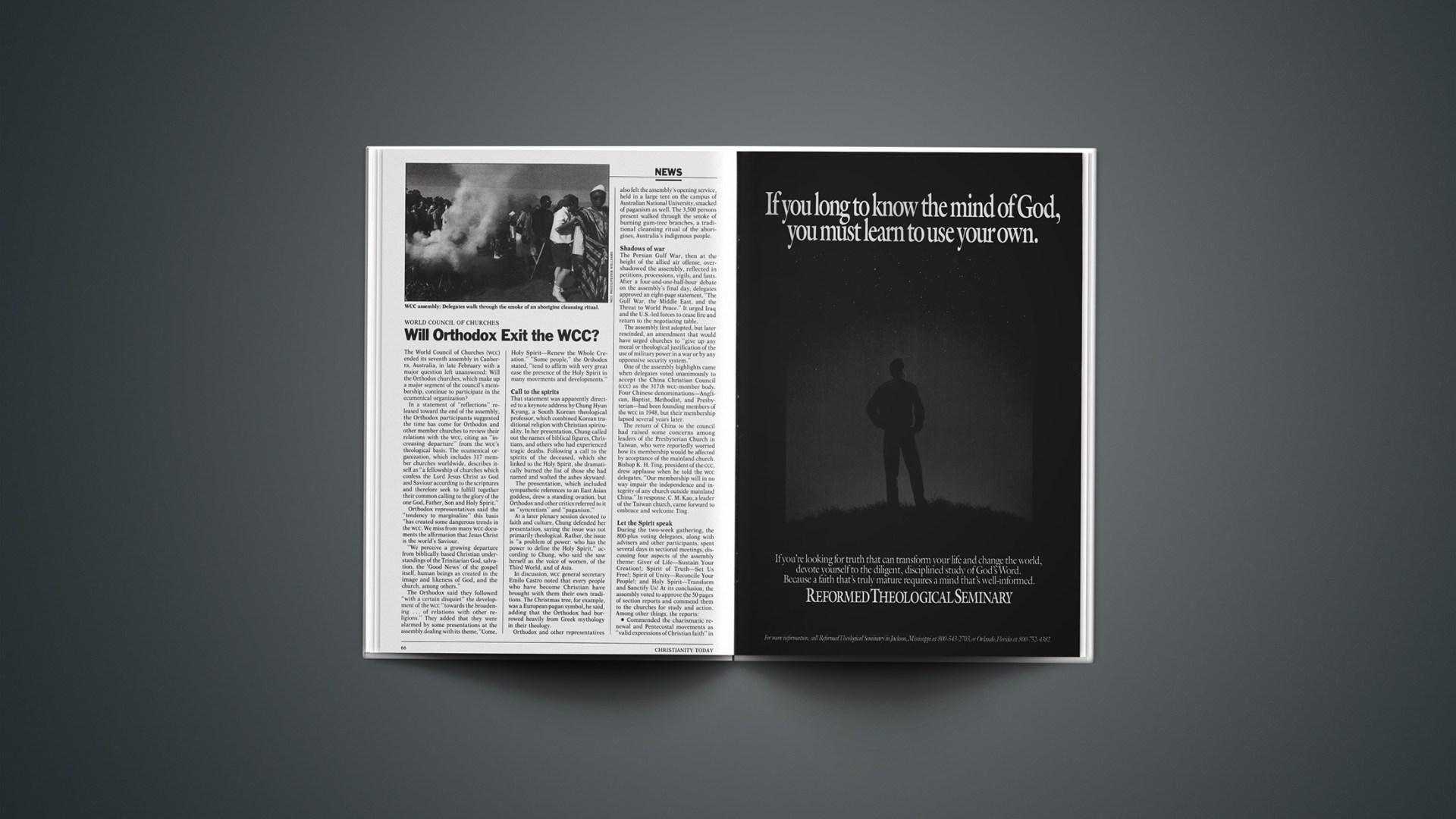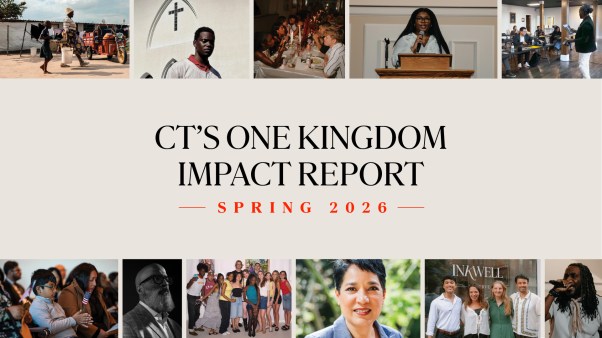The World Council of Churches (WCC) ended its seventh assembly in Canberra, Australia, in late February with a major question left unanswered: Will the Orthodox churches, which make up a major segment of the council’s membership, continue to participate in the ecumenical organization?
In a statement of “reflections” released toward the end of the assembly, the Orthodox participants suggested the time has come for Orthodox and other member churches to review their relations with the WCC, citing an “increasing departure” from the WCC’s theological basis. The ecumenical organization, which includes 317 member churches worldwide, describes itself as “a fellowship of churches which confess the Lord Jesus Christ as God and Saviour according to the scriptures and therefore seek to fulfill together their common calling to the glory of the one God, Father, Son and Holy Spirit.”
Orthodox representatives said the “tendency to marginalize” this basis “has created some dangerous trends in the WCC. We miss from many WCC documents the affirmation that Jesus Christ is the world’s Saviour.
“We perceive a growing departure from biblically based Christian understandings of the Trinitarian God, salvation, the ‘Good News’ of the gospel itself, human beings as created in the image and likeness of God, and the church, among others.”
The Orthodox said they followed “with a certain disquiet” the development of the WCC “towards the broadening … of relations with other religions.” They added that they were alarmed by some presentations at the assembly dealing with its theme, “Come, Holy Spirit—Renew the Whole Creation.” “Some people,” the Orthodox stated, “tend to affirm with very great ease the presence of the Holy Spirit in many movements and developments.”
Call To The Spirits
That statement was apparently directed to a keynote address by Chung Hyun Kyung, a South Korean theological professor, which combined Korean traditional religion with Christian spirituality. In her presentation, Chung called out the names of biblical figures, Christians, and others who had experienced tragic deaths. Following a call to the spirits of the deceased, which she linked to the Holy Spirit, she dramatically burned the list of those she had named and wafted the ashes skyward.
The presentation, which included sympathetic references to an East Asian goddess, drew a standing ovation, but Orthodox and other critics referred to it as “syncretism” and “paganism.”
At a later plenary session devoted to faith and culture, Chung defended her presentation, saying the issue was not primarily theological. Rather, the issue is “a problem of power: who has the power to define the Holy Spirit,” according to Chung, who said she saw herself as the voice of women, of the Third World, and of Asia.
In discussion, WCC general secretary Emilo Castro noted that every people who have become Christian have brought with them their own traditions. The Christmas tree, for example, was a European pagan symbol, he said, adding that the Orthodox had borrowed heavily from Greek mythology in their theology.
Orthodox and other representatives also felt the assembly’s opening service, held in a large tent on the campus of Australian National University, smacked of paganism as well. The 3,500 persons present walked through the smoke of burning gum-tree branches, a traditional cleansing ritual of the aborigines, Australia’s indigenous people.
Shadows Of War
The Persian Gulf War, then at the height of the allied air offense, overshadowed the assembly, reflected in petitions, processions, vigils, and fasts. After a four-and-one-half-hour debate on the assembly’s final day, delegates approved an eight-page statement, “The Gulf War, the Middle East, and the Threat to World Peace.” It urged Iraq and the U.S.-led forces to cease fire and return to the negotiating table.
The assembly first adopted, but later rescinded, an amendment that would have urged churches to “give up any moral or theological justification of the use of military power in a war or by any oppressive security system.”
One of the assembly highlights came when delegates voted unanimously to accept the China Christian Council (CCC) as the 317th WCC-member body. Four Chinese denominations—Anglican, Baptist, Methodist, and Presbyterian—had been founding members of the WCC in 1948, but their membership lapsed several years later.
The return of China to the council had raised some concerns among leaders of the Presbyterian Church in Taiwan, who were reportedly worried how its membership would be affected by acceptance of the mainland church. Bishop K. H. Ting, president of the CCC, drew applause when he told the WCC delegates, “Our membership will in no way impair the independence and integrity of any church outside mainland China.” In response, C. M. Kao, a leader of the Taiwan church, came forward to embrace and welcome Ting.
Let The Spirit Speak
During the two-week gathering, the 800-plus voting delegates, along with advisers and other participants, spent several days in sectional meetings, discussing four aspects of the assembly theme: Giver of Life—Sustain Your Creation!; Spirit of Truth—Set Us Free!; Spirit of Unity—Reconcile Your People!; and Holy Spirit—Transform and Sanctify Us! At its conclusion, the assembly voted to approve the 50 pages of section reports and commend them to the churches for study and action. Among other things, the reports:
• Commended the charismatic renewal and Pentecostal movements as “valid expressions of Christian faith” in their “emphases on the charisms of the Spirit described in the New Testament and their rediscovery of the ministry of healing.” It was noted that “charismatic renewal movements, women’s groups and youth groups at times challenge churches to greater openness and towards the breaking of denominational barriers.”
• Urged churches to recover the “sabbath principle” as a protection against unlimited activity and unrelenting desire for profit. Application of the Sabbath tradition to the debt-ridden parts of the international community was suggested. The Sabbatical Year and the Jubilee were observed in biblical times once in 50 years and were intended to break the spiral by which the rich become richer and the poor, poorer, the report explained.
• Said the church is challenged to define the relationships of humanity to the rest of creation. Anthropomonism (the idea that human beings are the only concern of God) denies the integrity of creation. However, sacralizing nature may lead toward pantheism and the denial of the uniqueness of men and women, created in the image of God, the report warned.
• Noted the collapse of the Marxist system but said it is no reason for “the triumphalism of the free-market system when we are increasingly confronted with its negative effects throughout the world.… The vast and shameful arms trade illustrates clearly the immorality of our world economic order and it is one of the root causes of the … Gulf war.… We are now more aware than ever that the market economy is in need of reform.”
• Stated that “the domination of women by men does not belong to human community as intended in God’s creation, but to the consequences of sin, which distort the community of women and men as well as the relationships between human beings and nature.”
• Called for the discernment of spirits, noting “not every spirit is of the Holy Spirit.” The Holy Spirit, the report said, is the Spirit of Christ, points to the Cross and Resurrection, and witnesses to the lordship of Christ.
In its message, the assembly said it “prays for the Spirit of God to lead Christians to a renewed vision of God’s rule, so that we may be accountable for our stewardship of ‘the mystery of the Gospel’ (Eph. 6:19). We pray that we may bear the ‘fruit of the Spirit’ that bears out God’s rule of love and truth, righteousness and justice and freedom, reconciliation and peace.”










